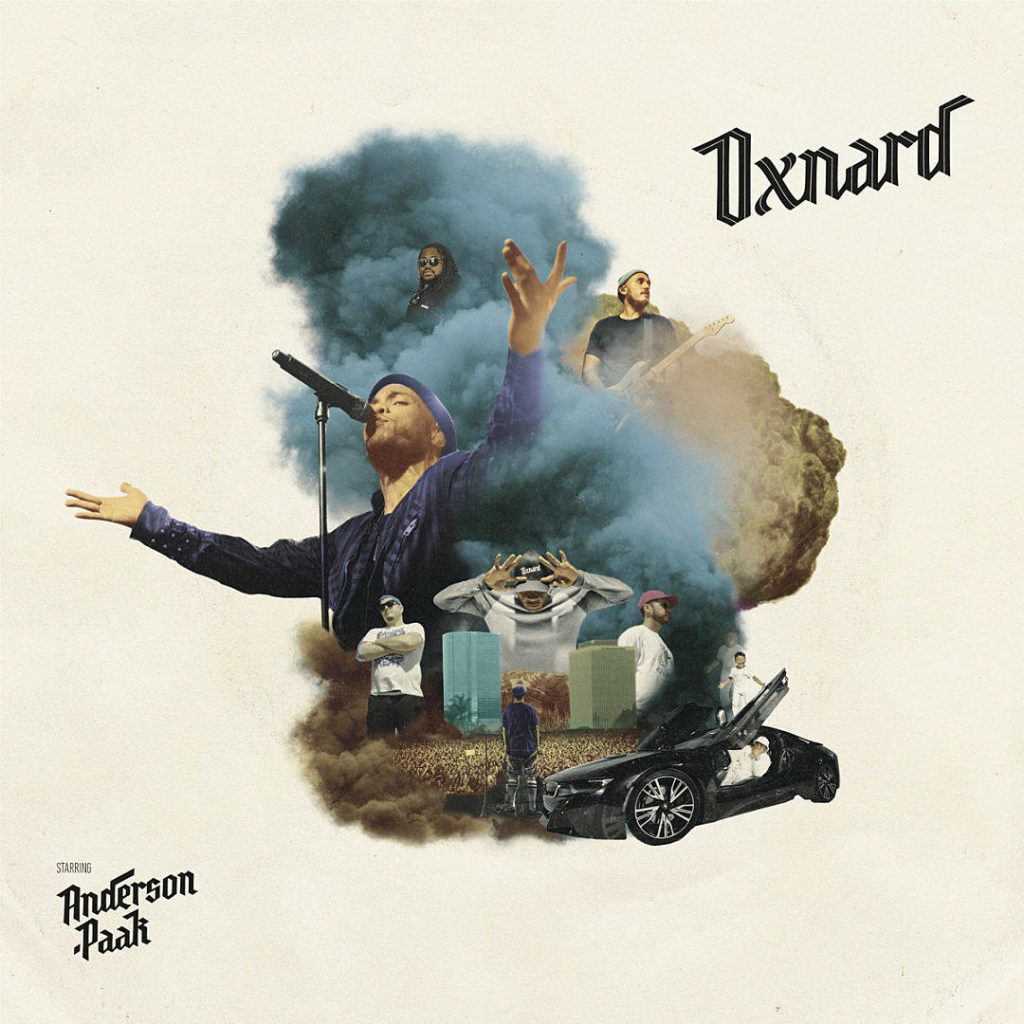
Courtesy of Aftermath Entertainment
If you’ve ever yearned for a soulful soundtrack to accompany a nice summer drive, “Oxnard” will surely satiate your desire. The latest album from Aftermath Entertainment rapper Anderson .Paak is bathed with the sunny sounds of Southern California, amounting to one of the year’s most energetic and enjoyable hip-hop projects.
The California rapper dropped his debut album “Venice” in 2014, which failed to make much of a commercial splash, despite being critically well-received. After appearing multiple times on rapper Dr. Dre’s 2015 album “Compton,” expectations were high for .Paak’s sophomore LP, “Malibu,” released in 2016 to widespread critical acclaim. .Paak’s latest project “Oxnard,” named after his California hometown, generally follows in the footsteps of its predecessor: many of the same techniques are utilized on the instrumentals, although the greater emphasis on gangsta-funk and pop rap suggests that Dr. Dre played a more significant role in the production of the beats this time around.
“Oxnard” is an easy listen overall — the runtime is only an hour and there’s enough variety from track to track to keep the listener engaged for the whole listen. .Paak has smoothed out a lot of his music’s rougher edges, as well, with a production that sounds much cleaner and studio-edited. Unfortunately, it isn’t a change for the better. The qualities that made “Malibu” such a memorable release were .Paak’s eccentricity and rawness, making that album’s beats hit harder. Although a lot of the instrumentals sound similar on “Oxnard,” the bass and instruments in the lower register sometimes get drowned in the mix. The album has too much talent behind it for this to ruin it entirely, but it is disappointing to hear .Paak making songs that sound overproduced.
Another change on “Oxnard” from “Malibu” is the feature list. Almost every song on the LP features another artist and .Paak managed to pull some A-listers for this album, with guests like J. Cole, Pusha T and Kendrick Lamar. Sometimes a bloated feature list can be detrimental to an album, as the main artist is either outshined by his guests or doesn’t appear enough on his own project — but this isn’t the case with .Paak. He manages to hold his own against even his most famous contemporaries, and it still always feels like his album.
One feature that certainly works out is on the opening track “The Chase,” with Kadhja Bonet providing some gorgeous guest vocals that blend seamlessly with the cinematic instrumental. It’s surely one of the most grandiose rap songs of the year with guitars, horns, flutes and chimes coalescing in the mix, and .Paak plays it off well.
The album’s lead single “Tints” features fellow California rapper Kendrick Lamar, whom .Paak has collaborated with in the past. .Paak and Lamar rap about how they don’t want to be bothered by the paparazzi and need their windows tinted — “I got way too much to lose, so roll your window up real quick,” .Paak sings on the hook. The bright synth lead that opens the chorus goes over nicely, but .Paak could have repeated the line “I need tints” fewer times without losing anything.
Following “Tints” is “Who R U?,” another definite highlight. .Paak lays down a solid flow on the first verse, rapping about his discontent with the current state of hip-hop in the mainstream. It’s one moment on the album that .Paak comes across as arrogant, but he sells it well and doesn’t cross the line of being too pretentious or annoying. The snappy percussion section on this track is satisfying as well, and the crescendoing instrumental adds some nice nuance to the song.
The project’s most political track, “6 Summers,” examines controversial topics like America’s consumer culture and gun violence. It’s a well-written song and .Paak addresses the song’s issues surprisingly well given that he isn’t usually a socially conscious rapper. One of my favorite lines is when .Paak subtly equates the weight of the jewelry he wears to the weight of slavery’s history in the jewelry industry, rapping: “Take chains off, take rings off/Bracelets and things, big aches and pains.”
The album does drop off a bit in quality during the second half. “Brother’s Keeper” and “Cheers” keep the energy going enough that the project never actually begins to get old, but songs like “Anywhere” and “Left To Right” are pretty forgettable and probably could have been cut. The guest features also tend to be less enticing in this section of the album; Pusha T kills it on “Brother’s Keeper,” but Dr. Dre’s, J. Cole’s and Snoop Dogg’s verses were sadly underwhelming. Even Q-Tip sounds worse than he did on A Tribe Called Quest’s final album from a few years ago, although his soberingly contemplative lyrics on “Cheers” are still quite engaging.
Given how monumental my expectations were following “Malibu,” it isn’t surprising that “Oxnard” is a bit of a disappointment comparatively. However, that doesn’t mean that it isn’t a delightfully fun and bright album. “Oxnard” sounds exactly like the kind of music you would expect to come from Southern California: warm, sunny and brazenly hedonistic. In general, it doesn’t rock the sociopolitical boat or come through with anything all that groundbreaking, but the smooth neo-soul sound of “Oxnard” is a satisfying reprieve from trap rap’s continuing domination of the charts, and a strong return from one of hip-hop’s most promising young artists.
Grade: 3.5/5
Aidan Vick (he/him) (22C) is from North Sioux City, South Dakota, majoring in English. He is in charge of making the Wheel’s crossword and newsletter and occasionally writes for the Arts & Entertainment and Sports sections. He enjoys indie music, basketball and chai tea.






